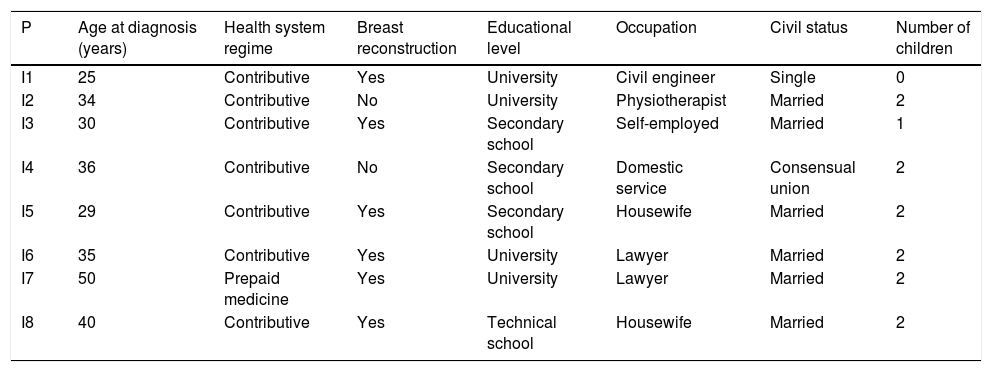To explore the experiences of a group of young women in relation to the reconstruction of their breasts after mastectomy.
MethodFocused ethnography, performed in the League against Cancer- Huila Section (Colombia). Through casual sampling oriented by criteria, semi-structured interviews were conducted with eight young women (diagnosed at 45 years or earlier) with breast cancer (reconstructed or not reconstructed after mastectomy) until saturation of discourse. Data collection was carried out between August-November 2017, after the endorsement of the Ethics Committee and the consent of the participants. Data was analysed using the thematic analysis technique after being anonymised.
ResultsThree issues emerged in the women's discourses: 1) The social stigma of being a young woman with breast cancer; 2) Learning to live with a body transformed by disease and treatment; and 3) Surviving, which is the most important thing.
ConclusionsBeing a young woman, and suffering from breast cancer implies a diversity of changes that permanently alter the lives of women and their bodies. Women prioritise survival in order to take care of others over breast reconstruction. At a healthcare level, the cultural and gender perspective must be incorporated to design individualised nursing interventions that contribute to better care.
Explorar las experiencias de un grupo de mujeres jóvenes en relación a la reconstrucción de sus senos posterior a la mastectomía.
MétodoEtnografía focalizada realizada en la Liga contra el Cáncer-Seccional Huila (Colombia). Mediante un muestreo casual orientado por criterio se realizaron entrevistas semiestructuradas a ocho mujeres jóvenes (diagnosticadas a los 45 años o antes) con cáncer de mama (reconstruidas o no después de la mastectomía) hasta conseguir saturación del discurso. La recogida de datos se efectuó entre agosto-noviembre de 2017, después de contar con aval del Comité de ética y el consentimiento de las participantes. Los datos se analizaron mediante la técnica del análisis temático posteriormente a ser anonimizados.
ResultadosEn los discursos de las mujeres emergieron tres temas: 1) El estigma social de ser una mujer joven con cáncer de mama; 2) Aprendiendo a vivir con un cuerpo transformado por la enfermedad y el tratamiento; y 3) Sobrevivir, eso es lo importante.
ConclusionesSer una mujer joven y padecer cáncer de mama implica una diversidad de cambios que alteran de forma permanente las vidas de las mujeres y su corporalidad. Las mujeres priorizan sobrevivir para cuidar de los otros sobre la reconstrucción de los senos. A nivel sanitario, se debe incorporar la perspectiva cultural y de género para diseñar intervenciones enfermeras individualizadas que contribuyan a una mejor atención.
Artículo
Comprando el artículo el PDF del mismo podrá ser descargado
Precio 19,34 €
Comprar ahora







